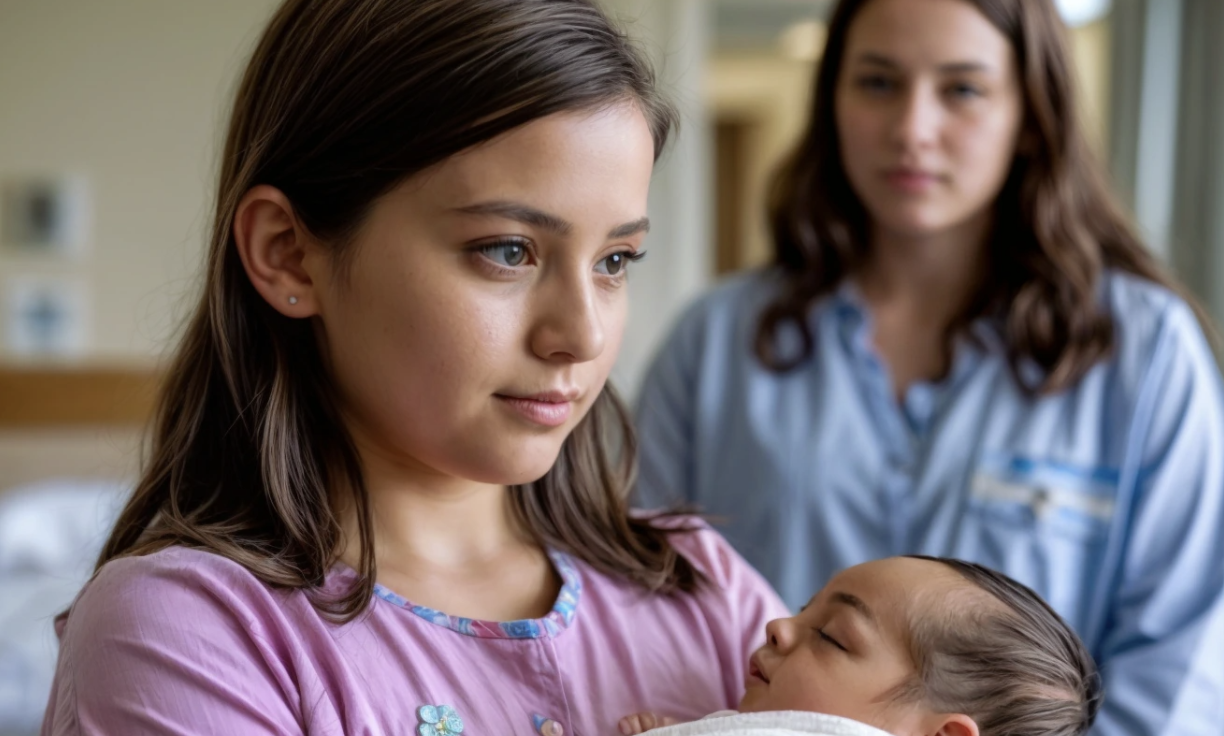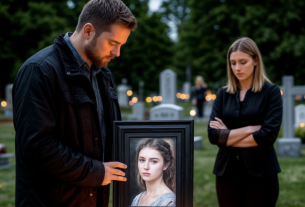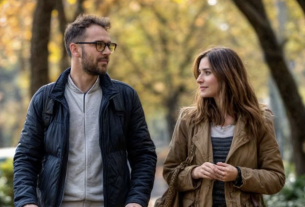One seemingly ordinary day in the emergency room of the district hospital, an event occurred that turned not only the lives of the staff upside down but also affected everyone who heard about it. The door to the ward opened with a quiet creak, and a small girl of about twelve years old entered the room. In her arms was a tiny infant, carefully wrapped in an old baby blanket. Her gaze was tense, her face frozen with an expression of worry and determination.
She held the child as if he were the most fragile treasure in the world. The nurse, noticing this, immediately got up from her seat:
— What happened? Who are you? Where are the parents?
— Please, — the girl interrupted, her voice trembling but sounding confident. — He’s burning up. He’s very sick. Please, help him!
Her words hung in the air like the toll of a bell. The child was immediately taken to the examination room, and the girl remained standing in the middle of the corridor. She did not cry, did not plead—she just waited, as if she knew a storm was about to begin, one she would have to endure.
And it truly began. Within minutes, the head of the department, a doctor, a police officer, and even a security guard rushed over. People surrounded the girl, asking questions, trying to understand what was happening.
— Are you his mother? — asked the female doctor.
— No, — the girl replied, looking straight into the eyes. — He is my brother. I am not his mother. I am his sister. We found him at night. Someone left him for us. In the entrance hall. I don’t know who. He was crying loudly… and he was cold as ice. No one at home could help. I just took him and brought him here.
A heavy silence fell in the corridor. Even the most experienced hospital staff froze, not knowing what to say. The police officer, usually strict and stern, lowered his gaze.
— Where are your parents? — the nurse asked cautiously.
The girl sighed like an adult who had grown up too soon.
— Mom… she’s not herself. She drinks. Dad left a long time ago. We haven’t seen him for many years. I do everything at home alone. But this… this is beyond anyone’s strength now. I knew only you could help him.
Her words sounded like a verdict, but even more — like a plea. The doctors exchanged glances. After a while, one of them returned with bad news — the child had a high fever, severe chills, but there was hope.
— He will live. Thank you, — said the doctor, looking at the girl with deep respect.
Only then did the tears she had held back until the last moment start streaming down her face. She hadn’t cried for a long time because she was strong, because she knew that if she broke down crying, she wouldn’t be able to do anything else. But now, with her little brother safe, her defenses cracked.
— Can I stay with him? Until he falls asleep?
The medical staff agreed. They let her into the ward, where the child lay on a small bed. His cheeks were red from the fever, his breathing was rapid but already steadier. The girl approached, gently took his tiny hand in hers, and began to whisper:
— I’m here, little one. I’m by your side. Don’t be afraid. I will always be here.
Meanwhile, behind the door, a completely different conversation was taking place. Medical staff, social workers, and police discussed a situation both cruel and deeply human.
— This family has long been classified as dysfunctional, — said the social worker. — The mother is an alcoholic, neighbors have long complained that the girl lives almost alone, without supervision. But no one did anything.
— And here’s the result: a 12-year-old girl saves someone else’s child like a true hero. And we just stand by watching everything fall apart.
— We cannot send her back home. It’s dangerous for her and for the baby. But we can’t put them in an orphanage either — she would never give him up. She already loves him like her own.
When the girl was invited into the office, she immediately understood they were talking about her fate.
— You want to take us away?
— No, — the woman from child services replied gently. — We want to help you. But tell us the truth: did you really find the child?
The girl nodded.
— He was in a cardboard box. There was a note on him: “Please save him. I cannot be his mother.” The handwriting wasn’t my mother’s. I couldn’t leave him there. Just couldn’t.
The social worker hugged her like a mother she had never known.
— You are very strong. Do you know that?
The girl nodded again, wiping away tears.
— Will they separate us?
— No, if everything goes well. We will find a safe place for you. A place with warmth, light, food, and love. The most important thing is you will be together.
A few days later, they ended up in a temporary shelter. Every evening, the girl sat by her brother’s crib, singing songs she remembered from her own childhood. Ahead of them were inspections, court hearings, new people. But she knew one thing: no matter how grown-up adults were, she would be there. Always.
Three years passed.
The sun gently played on the grass of a cozy country house. On the swings laughed a boy about three years old, cheerful and healthy. Nearby, holding his hands, stood a girl about fifteen — grown-up but with the same kind and serious gaze. It was her — the very girl who brought the child to the hospital. Now her name was Anya.
Life had changed drastically. After long checks and hearings, the court decided: Anya’s mother was deprived of parental rights, and the girl herself was deemed mature enough to keep the bond with her brother. They were first transferred to a specialized shelter, then a family was found — a simple but warm couple who dreamed of children.
— We don’t want to separate them, — said the future foster mother. — If she was able to become everything for him at 12, then we must give them a home. A shared home.
And they did.
Since then, the children lived together. Anya went to school, studied excellently, dreamed of becoming a doctor. The little boy, named Sasha, she raised with love and patience. Every morning he was the first to wake up and run to her bed:
— Anya, get up! Let’s go for a walk!
And she smiled, even when tired:
— Of course, little one. Let’s go.
When asked why she wasn’t afraid then, why she went to the hospital with a child in her arms, she just shrugged:
— Because he had no one… except me.
Now they had a home, a family, a future. And most importantly — love, which depended neither on age nor blood, but came from the heart.
But two years later, everything changed again.
The court ruled: despite all efforts and love, Anya could not officially raise her brother. Child services decided that due to her age and lack of a stable environment, she was unable to provide proper care. Her tears, vows, and pleas were all in vain.
The little brother was given to a good but unfamiliar family. Anya was sent to an orphanage.
For many months, she could not accept it. She cried every night, wrote letters she didn’t know to whom to give. Her heart remained with that very infant she once brought to the hospital. She no longer had family or a home — only pain and a single photo taken that night.
But she did not give up.
She started studying, with persistence bordering on fanaticism. She decided: when I grow up, I will become a lawyer or a social worker — and I will definitely find him. I will be there. Definitely.
Every day she wrote the same phrase in her notebook:
“Wait for me. I will definitely find you. I promised to be by your side.”
And now — ten years later.
At a suburban bus stop stood a young girl in a formal coat. In her hands were a bouquet of flowers and an envelope with a letter. She watched as a boy about fourteen came out of the school. He had brown eyes, the same dimples she had as a child, and a light birthmark on his cheek.
He walked, laughing with friends, unaware he was being watched. Suddenly, their eyes met — and he froze.
— Auntie… — he said uncertainly. — Have I seen you somewhere before?
The girl smiled through her tears:
— No. But I have known you all my life.
This was not just a story about courage. It was a story about how love can be stronger than law, fear, time, and even fate.



